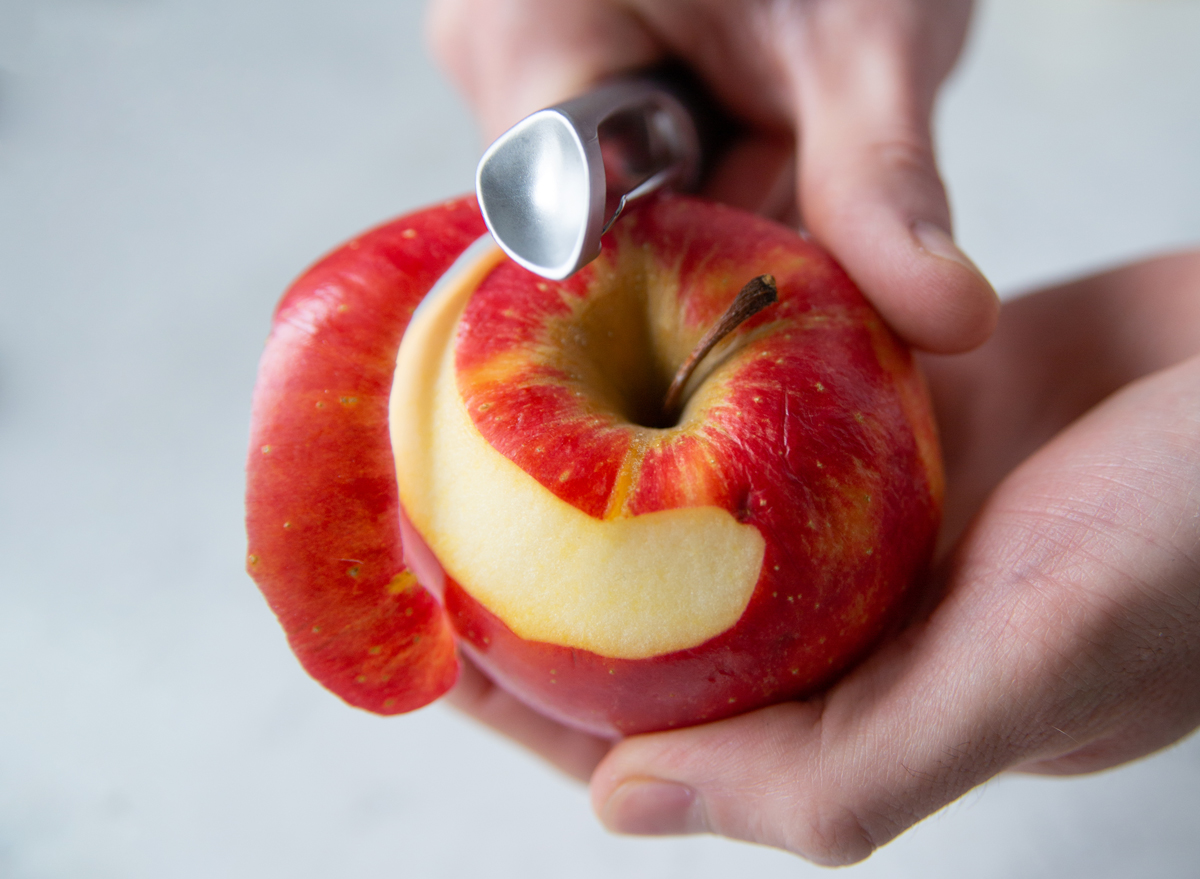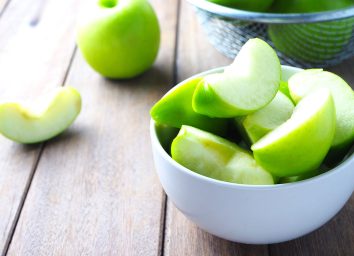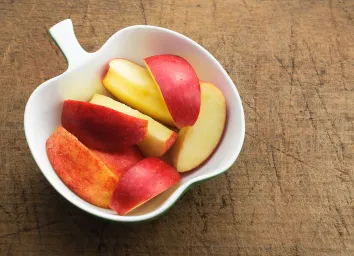The #1 Way You're Eating Apples Wrong, According to Science

Backtrack to the last time you snacked on an apple—did you peel and cut the fruit into finger-friendly slices or did you bite into it whole? If you're guilty of committing the former, here's some stark news: You're eating apples all wrong! If you're taking a knife or a peeler to the fruit's nutritious skin, you're missing out on many incredible health benefits apples have to offer.
According to a review published in Nutrition Journal, evidence has linked apple consumption to a reduced risk of many chronic ailments including obesity, cancer, and cardiovascular disease. Researchers believe many benefits of apples are due to their high levels of phytochemicals, including quercetin, catechin, and chlorogenic acid, all of which are strong antioxidants.
And most of that free-radical-fighting goodness? It's found in the skin!
What are the benefits you can only get from the skin?
As mentioned, many of the protective effects of apples have been attributed to their antioxidant properties. Apples contain several phytochemicals that are thought to be protective in cancer, according to a Food and Chemical Toxicology study, noting that these include carotenoids, flavonoids, isoflavonoids, and phenolic acids.
Flavonoids and phenolics, two phytochemicals that are thought to be protective in cancer, are found in higher quantities in apples retaining their skins, according to a Nature study. That same study noted that apples with skin have higher antioxidant capacity than those without, thanks to higher levels of vitamin C.
Speaking of vitamin C, apple skins contain significant levels of vitamins and minerals that are lower or almost non-existent in apple flesh. In fact, a raw apple with skin contains up to 312% more vitamin K, 70% more vitamin A, 35% more calcium and potassium, and 30% more vitamin C than a peeled apple.
Apple peels also contain the majority of the fiber found in apples. Without the skin, a medium apple has just 2 grams of fiber, but with the skin, the same size apple contains more than double that: 4.4 grams of fiber.
As a bonus, apple skin is very high in a specific type of fiber called pectin. This soluble fiber has prebiotic capabilities, which means that it acts as a food source for the beneficial "probiotic" bacteria that live in your gut, helping them to thrive so they can support your health. Pectin has been shown to promote the presence of anti-inflammatory beneficial bacterial species in the gut microbiome, which are known for their health-supporting functions.
What kind of apple is best?
With so many different varieties in the produce section, it can be tough to judge on anything other than color and taste. As it turns out, the red breeds have the most anti-inflammatory nutrients, which keep you slim and ward off hunger.
The best of the best, though, are Pink Lady apples, which top the charts when it comes to nutrition. According to a study conducted by the Department of Agriculture and Food and University of Western Australia researchers, Pink Lady apples have the most antioxidants and flavonoids compared to any other variety offered in grocery stores. They're also the first type of apple to be sold under a trademark-protected brand rather than the fruit's variety name. To qualify as a Pink Lady, apples have to meet a certain criteria in sweetness, crispness, and color.
Does eating the peel mean eating pesticides, too?
Since most of the fiber and antioxidants are in the peel, you'll want to consume an apple whole to reap the fruit's full benefits; however, most shoppers know that the skins of fruit and veggies often have pesticide residues. Thankfully, consumers have a trusty resource at our disposal. Every year, the Environmental Working Group (EWG) comes out with a report: Shopper's Guide to Pesticides in Produce.
The non-profit organization uses data from laboratory tests by the USDA Pesticide Testing Program and the Food and Drug Administration and then ranks fruits and vegetables by concentration of pesticide residue. A piece of produce lands on one of two lists: the "Dirty Dozen" or "Clean Fifteen." Unfortunately, conventional apples consistently rank on the Dirty Dozen list, and in 2020 they were listed fifth worst for pesticide residues out of 48 items.
To reduce your exposure to pesticides, the EWG recommends opting for organic produce whenever possible for these Dirty Dozen foods, including apples. Shoppers who report they "often or always" buy organic produce have significantly fewer organophosphate insecticides in their urine samples, according to a 2015 study published in the journal Environment Health Perspectives.
Organic apples are also the preferred produce of those seeking health benefits as organic apples contain a more diverse and balanced bacterial community compared to conventional apples, which support a more diverse and healthier microbiome, according to a Frontiers in Microbiology study.
On top of buying organic, if you're still concerned about bacteria and pesticide residue, check out the best way to wash an apple before digging in.
All in all, apples are a must-have on any grocery list thanks to the plethora of health benefits they offer. Read more with the 11 Side Effects of Eating Apples Every Day.
For more healthy eating news, make sure to sign up for our newsletter!








